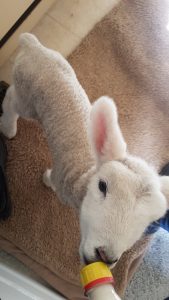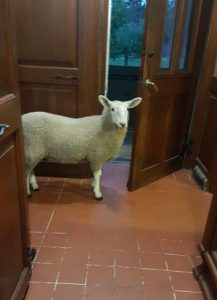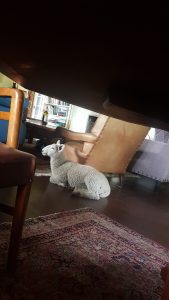
I want to edit this text so badly. I feel as though I am playing a game of Mad Libs. I have always wondered why people would dictate their texts into their phones, as it really did not feel natural to me. I used Speechnotes (https://speechnotes.co/) and followed the straightforward instructions. Click on the microphone and say “period, comma, question mark, etc. when you want to include your grammar.
The story it’s from last summer. It was interesting because it was the first summer on the farm. A little bit of background about me is that I moved from down small town and ended up with 44 Acres. I’ve never owned animals before. And now.. 16 pics 25 chicken, and I board three horses, with 16 Lambs. Last Summer we had lambs born. What some people don’t know about Lambs is that their mom can reject them. They are known as bottle lambs. I had to bottle feed a lamb we named her leo. This lamb lived in our house. She never had an accident after the first time. When when we kicked her out of the house she would just break back in. She knew how to open the kitchen door and she knew that she loved her bottle. So what she would do is klim is open r kitchen door climber stairs and walk into our bedroom at 5 in the morning. And say the very top of her lungs. My husband and I felt like we are in a Disney movie. We now had a lamb that live lived in our house. When people would come over this would be a frequent phrase. You have a lamb in your house yes her name is lamb. Land would follow me everywhere while I was doing doing the chart course. Lamb would follow me to feed the pigs and feed the chickens the horses and the lamps. She would never join the Lambs afterwards she would always be following me as a third dog. From far in the distance it look like I had a boxer, and a German Shepherd, small white dog. She would come when she was called even when she wasn’t. Lamb is still alive and we are concerned that she also might produce another bottle lamb. I am not sure that I’m ready or 1/4. Dog.. So this springtime so this spring time we ended up having 10 lambs and no bottle Lambs. We didn’t have to wake up twice in the night wheat. Check in on them. We didn’t have to keep a bottle of ready-made in the fridge. Do I miss this? Sometimes. But it was great to have a year off. next time around when we have our spring Lambs. We will be ready for any bottle Lambs that my might come to be. I have run out of time so union next time 4 the adventures of the piglets day out when they made it all the way to the river.



How does the text deviate from conventions of written English?
My sentences were very halted when I followed the instructions to include grammar. I find that when someone is speaking, the sentences are entirely run on. Still, when I was thinking of where and when to say comma or period, it ended up creating short phrases that resulted in a collection of factual statements and not the cute anecdote that I tried for. I tried to tell a different story without using any grammar, and that story had a surprisingly similar word count. Still, I found that I repeated my words in the beginning of sentences when I wasn’t too sure what to say because of the unscripted nature. With the saying period to end my thought, it allowed time for me to catch my breath and think about what I wanted to say next.
What is “wrong” in the text? What is “right”?
It was interesting to see the errors in the text could have been my accent not being recognized by the program. The word, pigs, and pics were confused. This could be due to the lack of enunciation when I am speaking casually. The enunciation paired with the speed at which I was telling the story could have been garbled. The program started to learn my speech pattern as I went along. I would say lambs, it would show the predicted word, lamps, but then it seemed to correct itself when it appeared in the notes below. My gross estimate would say that 75% of the text was correct. The program was impressively accurate. So to answer the question about what was right. I would say that most of the words that I spoke appeared on the page. I was surprised that there were entire phrases that were missing. Perhaps, I turned my head away from the microphone, or my pace increased with my excitement level. However, that merely affected the word count. In terms of the story, I can see that the main points were recorded.
What are the most common “mistakes” in the text, and why do you consider them “mistakes”?
Why is the L capitalized in lamb? I did mention that we called one lamb “Lamb,” so did the technology catch that and apply it to further sentences? For the most part, the mistakes were a result of a lack of enunciation on my part. I did not realize that I had a soft f sound for the word “for.” The word “the” is prevalent in the English language, and perhaps I do not pronounce it anymore. “Climber stairs” is actually “climb the stairs.” I enjoy listening to the casual speech pattern that you find in podcasts. There is a distinct difference when the broadcast is scripted vs. unscripted. I would not consider the mistakes a bad thing; they are simply a reflection of how I speak daily. I can learn and be aware of the misinterpretations made by the program.
What if you had “scripted” the story? What difference might that have made?
We were presented with 3 different audio clips in this week’s module. The casual, but the clear speech of George Paul on CBC. A lecture by Walter Ong and the performance by the Orson Welles’ Mercury Theatre company. I listened to all three again after this activity, and I found that I noticed the so-called errors in the lecture by Walter Ong, that I didn’t hear the first time. I realized that it was a recording of someone presenting live and unscripted. He repeated words at the beginning of his sentences. He did not fully pronounce each word. These are linking words that we rush through daily. Listen to your friend tell a story today, you will at least once here the sound “tuh” instead of the word to. “I went t- the store.” Then you switch over to the theatre production, and each word is clear, well structured, and the sentences almost sound musical. The scripted play was well-rehearsed and projected well. You can almost feel the electric atmosphere that was resonating around that theatre. To have even some talking points to work from would have helped my story. The overall stream of consciousness that was produced did not contain varied sentence structure and literary devices. If it was scripted, there would have been an effort to include humorous sections integrated throughout and perhaps a well-placed pun or to.
In what ways does oral storytelling differ from written storytelling?
To be considered a natural storyteller, you need to be able to read your audience. Their needs to be a sense of charisma and the ability to add and remove points at a moment’s notice to maintain the flow. I have not been exposed to many cultures who have oral traditions; however, I can make a comparison with comedians. Jerry Seinfeld is a type of comedian that integrates his observations into humorous stories that he shares on stage. Another example that I have seen recently is late-night talk show hosts that usually begin the show with a monologue in front of an audience. During COVID, I picture them sitting at home, alone, attempting to complete the speech without any reaction or feedback. The energy is different, and many of them seem uncomfortable. You can tell it is scripted, and there are no distractions to pull them in a different direction. Written storytelling is practiced, massaged, erased, critiqued, and then presented to the world. There is an expectation that it is without flaws once it is on paper. The oral storytelling is more forgiving, but easily misinterpreted and forgotten.